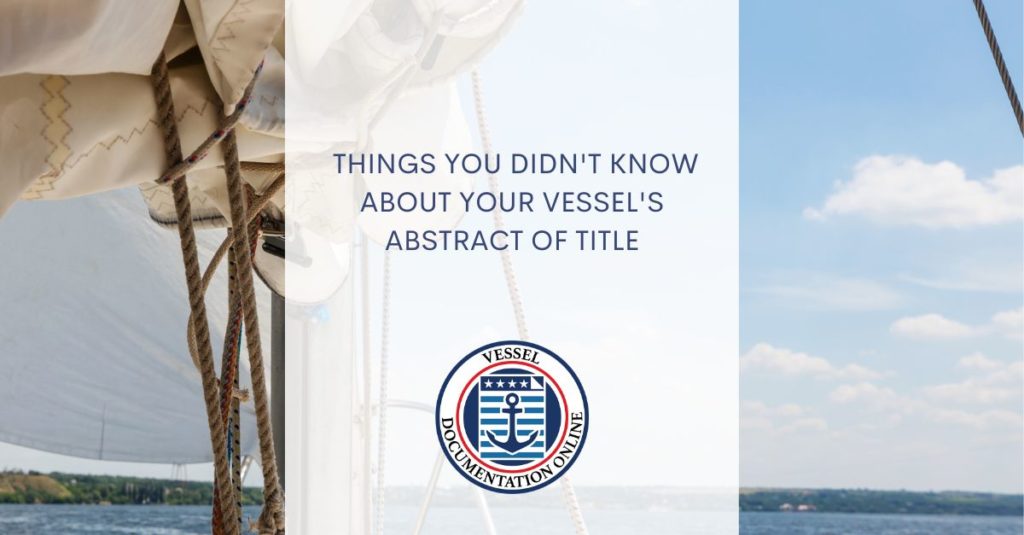You should be familiar with the abstract of the title for your vessel if you are the vessel owner. An abstract of title is a record of all of the transactions that have occurred about a specific vessel during its history.
It contains information on the history of ownership of the vessel and details about any mortgages or other security interests taken out against the vessel. An abstract of title will be necessary for you if you are considering selling your boat or if you are required to provide evidence of ownership to initiate legal action.
Even though most vessel owners are knowledgeable about the title and registration of their vessel, they may not be aware of all the information included in an abstract of the title. Here are some aspects regarding your boat’s abstract of title that you may not be aware of.
An Abstract of Title Can Show Past Repairs and Replacements Made To a Vessel
If you have ever purchased or sold a property, you have undoubtedly completed a title search. The same applies if you’ve just purchased or sold a boat. These checks are meant to unearth any maritime liens filed against the property, such as a mechanic’s lien filed by a creditor seeking payment for work on the yacht.
It probably isn’t that interesting to you. Most of us don’t have maritime liens on our boats, and nobody will surprise us with one as a gift. The title search doesn’t genuinely indicate the worst-case scenario for our boats but rather the best-case scenario.
The abstract of the title does not disclose maritime liens. Still, it does identify repairs and other transactions conducted by the owner of the record, such as changes in ownership or the vessel’s name and registration number. Changes to your boat’s name (or even its registration number) may be documented with Vessel Documentation Online LLC, which you may not realize until you look it up.
It Can List Any Mortgages or Liens against the Boat
The boat’s mortgage or lien status might be disclosed. Most boat purchasers worry about the abstract of the title since it must be submitted to the lender holding the first mortgage on the boat before the loan is approved.
If it shows liens on the boat, the owner can’t sell them until they are settled. Many boat owners worry about this because they don’t want to pay off numerous lenders once they sell their boats.
However, this problem may be avoided by simply not purchasing a boat that already has liens on it. Remember that even if there are no liens on the property at the time of purchase, new lenders may enter the picture later (this has occurred!).
Abstract Of Title Includes Info On Any Previous Owners Of The Boat.
Purchasing a boat is thrilling, but the pleasure does not stop there. In fact, for many individuals, this is only the beginning of their time on the water. Boats are an investment that needs ongoing maintenance and care. Knowing as much as possible about the abstract of the title associated with your boat is crucial so that you can successfully navigate these seas. An abstract of the title is a document that provides information on the history of your boat.
For those unfamiliar with the term, an abstract of the title is a document that reports this information. It keeps a record of any former owners, allowing you to contact them if necessary, and it keeps a record of any problems that may have been experienced with your boat. It’s the equivalent of giving your vessel a clean bill of health.

It Shows any Legal Disputes Involving the Boat.
In addition to an “abstract of title,” boat buyers and sellers may get a “certificate of title.” The first is provided by the state and serves as proof of ownership when registering and titling the boat. In contrast, the second is made by the dealer and serves as proof of payment for any outstanding loans or other encumbrances. It’s essential to understand that not all liens are the same.
They may be removed from your title via a write-off, but they can also be challenged in court and remain there even if you pay them. Creditors are safeguarded by a system that includes titles and liens. In the event of nonpayment of a loan, the lender may repossess the borrower’s yacht following applicable law. People who sell you assets and expect payment in the future are also shielded from losing them without due process.
If you’re ever unsure whether you own your vessel or not, and you want to get some peace of mind about it, there’s a simple solution: contact Vessel Documentation Online LLC by calling (877) 564-1398. They can help you with any questions you might have about the ownership status of your vessel.

